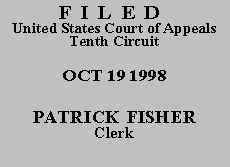

| PATRICK C. LYNN,
Plaintiff-Appellant, v. RUTH DUBOWSKI; PAUL MORRISON; WILLIAM CLEAVER; EDWARD BYRNE; JOHNSON COUNTY, KANSAS, Municipality of Johnson County; (NFN) JOHNSTON; (NFN) LAWHEAD; (NFN) PUNCH, in their individual and official capacities, Defendants-Appellees. |
|
Plaintiff Patrick C. Lynn was convicted in a Kansas state court in November 1996 of a variety of charges, including aggravated kidnaping and rape, and is currently incarcerated in a Kansas state prison. He brought this action seeking damages and injunctive relief under 42 U.S.C. § 1983 and various state tort theories. The district court summarily dismissed the complaint as frivolous pursuant to 28 U.S.C. § 1915(e)(2)(B)(i). We review the district court's decision to dismiss the complaint as frivolous for an abuse of discretion, see Schlicher v. Thomas, 111 F.3d 777, 779 (10th Cir. 1997), and affirm.
Plaintiff's complaint named as defendants the wife of a juror, the prosecuting attorney, the trial judge, and his defense counsel, all from the state court criminal trial; Johnson County, Kansas, where he was incarcerated following his convictions; and three officers at the Johnson County jail. He alleged that his constitutional rights were violated by a conspiracy involving the juror's wife, prosecuting attorney, defense counsel and trial judge. He also alleged that he was denied meaningful access to the courts during his stay at the Johnson County jail.
The district court concluded that plaintiff's allegation of a conspiracy were malicious and unsupported and should be rejected sua sponte, see Neitzke v. Williams, 490 U.S. 319, 324-25 (1989), stating in part that
Plaintiff's allegations that the District Attorney was allowed to "run amok", that defendant Dubowski [the juror's wife] intentionally allowed herself to be "used as a pawn" by the District Attorney, and that the trial judge adopted the statements of the District Attorney knowing they were made falsely and maliciously are completely without support. The court likewise finds no legal authority for the plaintiff's assertion that he was entitled to a hearing after jurors reported his telephone contacts with them to the trial court. It is evident that the trial court acted swiftly to curtail plaintiff's improper and unauthorized contacts with jurors and that the court's order was tailored to do no more than prevent plaintiff from intimidating jurors.
R. Doc. 4, District court's November 18, 1997 order at 6. The court found that because plaintiff was represented by counsel while in the Johnson County jail and that he had telephone access to counsel, any restrictions on the amount of postage he could purchase while in the jail did not deny him access to the courts. It also held that his claims for injunctive relief concerning his conditions of confinement at the jail were moot because he had been transferred to another facility.
On appeal, plaintiff contends that his complaint stated a colorable claim for conspiracy and that his claim regarding the conditions of confinement at the Johnson County jail is not moot because he might be incarcerated there again at some point. We have considered plaintiff's arguments and reviewed the record and affirm the district court's dismissal of the complaint for substantially the same reasons as stated in the district court's November 18, 1997 order.
The judgment of the district court dismissing plaintiff's complaint as frivolous pursuant to 28 U.S.C. § 1915(e)(2)(B)(i) is AFFIRMED. We conclude that this appeal is frivolous and counts as a prior occasion for purposes of § 1915(g). The mandate shall issue forthwith.
Entered for the Court
Circuit Judge
*. This order and judgment is not binding precedent, except under the doctrines of law of the case, res judicata, and collateral estoppel. The court generally disfavors the citation of orders and judgments; nevertheless, an order and judgment may be cited under the terms and conditions of 10th Cir. R. 36.3.